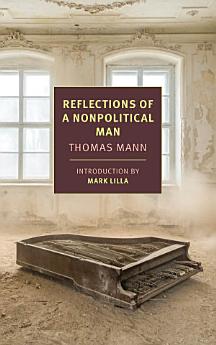Reflections of a Nonpolitical Man
ឧសភា 2021 · New York Review of Books
សៀវភៅអេឡិចត្រូនិច
592
ទំព័រ
family_home
មានសិទ្ធិ
info
reportការវាយតម្លៃ និងមតិវាយតម្លៃមិនត្រូវបានផ្ទៀងផ្ទាត់ទេ ស្វែងយល់បន្ថែម
អំពីសៀវភៅអេឡិចត្រូនិកនេះ
A classic, controversial book exploring German culture and identity by the author of Death in Venice and The Magic Mountain, now back in print.
When the Great War broke out in August 1914, Thomas Mann, like so many people on both sides of the conflict, was exhilarated. Finally, the era of decadence that he had anatomized in Death in Venice had come to an end; finally, there was a cause worth fighting and even dying for, or, at least when it came to Mann himself, writing about. Mann immediately picked up his pen to compose a paean to the German cause. Soon after, his elder brother and lifelong rival, the novelist Heinrich Mann, responded with a no less determined denunciation. Thomas took it as an unforgivable stab in the back.
The bitter dispute between the brothers would swell into the strange, tortured, brilliant, sometimes perverse literary performance that is Reflections of a Nonpolitical Man, a book that Mann worked on and added to throughout the war and that bears an intimate relation to his postwar masterpiece The Magic Mountain. Wild and ungainly though Mann’s reflections can be, they nonetheless constitute, as Mark Lilla demonstrates in a new introduction, a key meditation on the freedom of the artist and the distance between literature and politics.
The NYRB Classics edition includes two additional essays by Mann: “Thoughts in Wartime” (1914), translated by Mark Lilla and Cosima Mattner; and “On the German Republic” (1922), translated by Lawrence Rainey.
When the Great War broke out in August 1914, Thomas Mann, like so many people on both sides of the conflict, was exhilarated. Finally, the era of decadence that he had anatomized in Death in Venice had come to an end; finally, there was a cause worth fighting and even dying for, or, at least when it came to Mann himself, writing about. Mann immediately picked up his pen to compose a paean to the German cause. Soon after, his elder brother and lifelong rival, the novelist Heinrich Mann, responded with a no less determined denunciation. Thomas took it as an unforgivable stab in the back.
The bitter dispute between the brothers would swell into the strange, tortured, brilliant, sometimes perverse literary performance that is Reflections of a Nonpolitical Man, a book that Mann worked on and added to throughout the war and that bears an intimate relation to his postwar masterpiece The Magic Mountain. Wild and ungainly though Mann’s reflections can be, they nonetheless constitute, as Mark Lilla demonstrates in a new introduction, a key meditation on the freedom of the artist and the distance between literature and politics.
The NYRB Classics edition includes two additional essays by Mann: “Thoughts in Wartime” (1914), translated by Mark Lilla and Cosima Mattner; and “On the German Republic” (1922), translated by Lawrence Rainey.
អំពីអ្នកនិពន្ធ
Thomas Mann (1875–1955) was a novelist, critic, and essayist who received the 1929 Nobel Prize in Literature. Born in Germany, he fled to Switzerland and then to California after Hitler’s rise to power in 1933, returning to Switzerland in 1952. His most influential works include Death in Venice and The Magic Mountain.
Walter D. Morris (1929–2001) was a translator and professor of German literature at Iowa State University.
Mark Lilla is a historian and professor of humanities at Columbia University. New York Review Books has published his The Shipwrecked Mind: On Political Reaction and The Reckless Mind: Intellectuals in Politics. He lives in New York City.
Walter D. Morris (1929–2001) was a translator and professor of German literature at Iowa State University.
Mark Lilla is a historian and professor of humanities at Columbia University. New York Review Books has published his The Shipwrecked Mind: On Political Reaction and The Reckless Mind: Intellectuals in Politics. He lives in New York City.
វាយតម្លៃសៀវភៅអេឡិចត្រូនិកនេះ
ប្រាប់យើងអំពីការយល់ឃើញរបស់អ្នក។
អានព័ត៌មាន
ទូរសព្ទឆ្លាតវៃ និងថេប្លេត
ដំឡើងកម្មវិធី Google Play Books សម្រាប់ Android និង iPad/iPhone ។ វាធ្វើសមកាលកម្មដោយស្វ័យប្រវត្តិជាមួយគណនីរបស់អ្នក និងអនុញ្ញាតឱ្យអ្នកអានពេលមានអ៊ីនធឺណិត ឬគ្មានអ៊ីនធឺណិតនៅគ្រប់ទីកន្លែង។
កុំព្យូទ័រយួរដៃ និងកុំព្យូទ័រ
អ្នកអាចស្ដាប់សៀវភៅជាសំឡេងដែលបានទិញនៅក្នុង Google Play ដោយប្រើកម្មវិធីរុករកតាមអ៊ីនធឺណិតក្នុងកុំព្យូទ័ររបស់អ្នក។
eReaders និងឧបករណ៍ផ្សេងទៀត
ដើម្បីអាននៅលើឧបករណ៍ e-ink ដូចជាឧបករណ៍អានសៀវភៅអេឡិចត្រូនិក Kobo អ្នកនឹងត្រូវទាញយកឯកសារ ហើយផ្ទេរវាទៅឧបករណ៍របស់អ្នក។ សូមអនុវត្តតាមការណែនាំលម្អិតរបស់មជ្ឈមណ្ឌលជំនួយ ដើម្បីផ្ទេរឯកសារទៅឧបករណ៍អានសៀវភៅអេឡិចត្រូនិកដែលស្គាល់។







